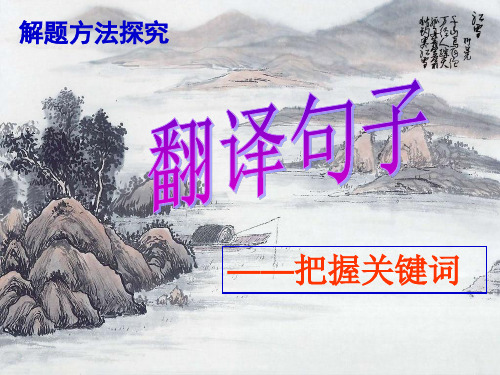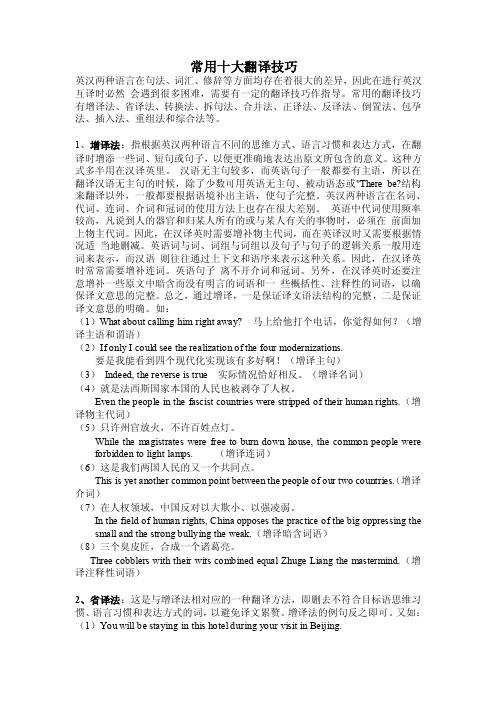句子的正译与反译
- 格式:doc
- 大小:46.00 KB
- 文档页数:4

专升本英语翻译讲解一、把握和理解句子结构1. What can be done has been done.正译:能做的事情都已做了。
2. Having been given sucha good chance, how could she let it get away?正译:人家给了她这样一个好机会,她怎么能轻易放过?3. The police forced the way into the room, only to find the safe empty.正译:警察破门而入,结果发现保险箱已被洗劫一空。
4. It is impolite not return telephone calls—regardless of whom they are from.正译:不回电话是不礼貌的,不管电话是谁打来的。
5. The increase in international business has created a need for managers with skills in cross-culture communication.正译:国际贸易的增加需要具有跨国文化交流技能的经理。
6. Learning how to use the Internet effectively as a marketing tool means that you need to learn tow different but related bodies of language.正译:学习有效地使用因特网作为营销工具,意味着要学习两类互不相同却互相关联的知识。
7. I could not but admit that it was a wise decision.正译:我不得不承认那是个明智的决定。
8. These reports provide information on your courses and activity planning for the year.正译:这些报告为你提供本年度的课程与活动计划的信息。

1、正说反译:Miss the bus没有赶上车Live up to the expectations of my parent不辜负父母的期望Be absent from the meeting没有出席会议A final decision不可更改的决定Frost-free refrigerator无霜冰箱Freeze别动Mortally ill不治之症The window refuses to open窗户打不开Children were excluded from getting in the building 儿童不许进入这个房间The explanation is pretty thin这个解释站不住脚I have fallen behind with my correspondence我有一些信件还没有回复Fully clothes, he fell across his bunk and was instantly sleep 衣服也不脱,他往床上横着一倒,不一会儿就睡着了Don’t lose time in posting this letter不要忘了寄这封信No deposit will be refunded unless ticket produced凭票退押金例1:原文:她忍住了没有笑出声。
译文:She refrained from laughing.例2:原文:花园根本无人整理。
译文:The garden was in a state of total neglect.例3:原文:我不能忍受你的脾气。
译文:Your temper is more than I can bear.例4:原文:他宁死不屈。
译文:He would die before yielding.例5:原文:生活远非净是乐事。
译文:Life is far from being a bed of roses.例6:原文:风景美得无以言表。



英语语句翻译方法英语语句翻译方法有哪些?翻译其实只要掌握了方法并不难,看看下面吧!一、正反、反正表达法i.汉语从反面表达,译文从正面表达例1:他提出的论据相当不充实。
译文:The argument he put forward is pretty thin. (词) 例2:我们确信,年轻一代将不会辜负我们的信任。
译文:We are confident that the younger generation will prove worthy ofour trust. (短语)例3:他七十岁了,可是并不显老。
译文:He was 70, but he carried his years lightly. (句子)II.汉语从正面表达,译文从反面表达例1:他这个人优柔寡断,而且总是反复无常。
译文:He was an indecisive sort of person and always capricious. (词)例2:调查结果清清楚楚地显示病人死于心脏病。
译文:The investigation left no doubt that the patient had died of heartdisease.(短语)例3:这类举动迟早会被人觉察的。
译文:Such actions couldn’t long escape notice. (句子) III.特殊的否认句式例1:有利必有弊。
译文:There is not any advantage without disadvantage. (双重否认)例2:我们在那个城市从未因为是犹太人而遭受歧视。
译文:In that city, we had never suffereddiscrimination because we wereJews. (否认转移)二、分句、合句法I.分句法汉译英时,需要分译的句子多数是长句,或者是构造复杂的复句。
这种句子如果译成一个长句,就会使译文冗长、累赘、意思表达不清楚,也不符合英文习惯。

常用十大翻译技巧英汉两种语言在句法、词汇、修辞等方面均存在着很大的差异,因此在进行英汉互译时必然会遇到很多困难,需要有一定的翻译技巧作指导。
常用的翻译技巧有增译法、省译法、转换法、拆句法、合并法、正译法、反译法、倒置法、包孕法、插入法、重组法和综合法等。
1、增译法:指根据英汉两种语言不同的思维方式、语言习惯和表达方式,在翻译时增添一些词、短句或句子,以便更准确地表达出原文所包含的意义。
这种方式多半用在汉译英里。
汉语无主句较多,而英语句子一般都要有主语,所以在翻译汉语无主句的时候,除了少数可用英语无主句、被动语态或"There be?结构来翻译以外,一般都要根据语境补出主语,使句子完整。
英汉两种语言在名词、代词、连词、介词和冠词的使用方法上也存在很大差别。
英语中代词使用频率较高,凡说到人的器官和归某人所有的或与某人有关的事物时,必须在前面加上物主代词。
因此,在汉译英时需要增补物主代词,而在英译汉时又需要根据情况适当地删减。
英语词与词、词组与词组以及句子与句子的逻辑关系一般用连词来表示,而汉语则往往通过上下文和语序来表示这种关系。
因此,在汉译英时常常需要增补连词。
英语句子离不开介词和冠词。
另外,在汉译英时还要注意增补一些原文中暗含而没有明言的词语和一些概括性、注释性的词语,以确保译文意思的完整。
总之,通过增译,一是保证译文语法结构的完整,二是保证译文意思的明确。
如:(1)What about calling him right away? 马上给他打个电话,你觉得如何?(增译主语和谓语)(2)If only I could see the realization of the four modernizations.要是我能看到四个现代化实现该有多好啊!(增译主句)(3)Indeed, the reverse is true 实际情况恰好相反。
(增译名词)(4)就是法西斯国家本国的人民也被剥夺了人权。
短句翻译中的正译与反译技巧作者:邵婷王秀峰来源:《校园英语·下旬》2018年第05期【摘要】正译和反译是译者应熟练掌握的两种常见翻译技巧。
短句是指字数简短,语言逻辑简单的句子,在短句翻译中,最常用到的翻译技巧就是正译与反译。
本文通过对比分析短句翻译中的正译与反译,从具体实例中分析了这两种翻译技巧在不同场合下的使用情况,以期帮助翻译人员更灵活的处理短句翻译。
【关键词】短句翻译;正译;反译;翻译技巧一、引言“正译”一词,最早出现于清朝魏象乾的《繙清说》一书中。
书中提出了“正译”的翻译标准,并针对翻译技巧提出具体要求。
书中写到,译者要做到“不增不减,不颠不倒,不恃取意”。
这里的正译可以理解为在翻译原文本时,尽量不任意的增加删减,颠倒顺序,改动原意。
正译是指把句子按照与源语相同的语序或表达方式进行翻译。
翻译时如果难以采用正译法,或因英汉两种语言习惯不同,需要加强修辞效果,更确切地表达原文的含义时,译者可以考虑用反面表达,或将原文的反面表达改用正面表达,使译文更流畅。
在翻译短句的过程中,原文从正面表达,译文有时可以从反面表达,这种翻译方法称为“正说反译法”;而原文从反面表达时译文可以从正面表达这种翻译方法称为“反说正译”。
这两种翻译方式统称为反译法。
反译法是指将语句按照和原来句子顺序相反的次序重新排列。
本文通过分析短句,探讨在翻译实践中怎样巧妙运用正译和反译,使译文表达更贴切,读者更易理解。
二、短句翻译中的正译无论在英译汉还是汉译英中,正译都是一种比较简单的翻译技巧,尤其在短句中,正译只需按原文的行文逻辑进行翻译,无需改动原文逻辑顺序或将肯定词更换为否定词。
1.英译汉中的正译。
例1:He gave me an indefinite answer. 他给了我一个不清楚的答复。
例2:The doubt was still unsolved. 疑团仍然未解决。
例3:Do you know why she is trying to avoid you?你知道她为什么躲着你吗?2.汉译英中的正译。
正反译法:1 他这么做是有道理的。
(正说反译)He doesn't do it for nothing.2 活到老,学到老。
(正说反译)Never too late to learn.3趁还没忘记,我现在就来做这件事。
(反说正译)I'll do it now before I forget it.物称与人称1 我突然想到了一个主意。
An idea suddenly stuck me.2 他们欣喜若狂。
A great elation overcame them.3 他开始变得惊恐万状。
Alarm began to take entire possession of him.语态的转换1这孩子昨天挨了一顿批评。
The boy was criticized yesterday.2 爱情不能强求。
Love can't be forced.3中国到处都在打乒乓球。
Table tennis is played all over China.重复的翻译1 幸福在于自知拥有幸福。
Happiness lies in the consciousness we have it.2 这是革命的春天,这是人民的春天,这是科学的春天。
This is the springtime for the revolution, this is the springtime for the people, this is the springtime for the sciences.3 教育要面向全世界,面向社会,面向未来。
Education must be geared to the needs of the world, the society and the future.外位语翻译1 从各个方面考虑,我们认为这是个好的计划。
All things considered, it is a good plan.2你的朋友们会说什么呢?Your friend, what will they say?3那只猫吃了那只老鼠,连皮带骨都吃了。
句子的正译与反译英汉两种语言习惯不同,有时英语里正说的句子,译成汉语时不得不处理成反说,反之亦然。
所谓正译,是指把句子按照与原语相同的语序或表达方式译入目的语。
所谓反译则是指把句子按照与原语相反的语序或表达方式译入目的语。
正译和反译都是一种翻译方法,其目的是为了解决翻译过程中所遇到的表达方面的困难,使译文更通顺达意。
实际上英汉两种语言均可以从正面或反面来表达同一概念。
如:在美国,人人都能买到枪。
正译:In the United States, everyone can buy a gun.反译:In the United States, guns are available to everyone.你可以从因特网上获得这一信息。
正译:You can obtain this information on the Internet.反译:This information is accessible/available on theInternet.他突然想到了一个新主意。
正译:Suddenly he had a new idea.He suddenly thought out a new idea.反译:A new idea suddenly occurred to/struck him.他仍然没有弄懂我的意思。
正译:He still could not understand me.反译:Still he failed to understand me.无论如何,她算不上一位思维敏捷的学生。
正译:She can hardly be rated as a bright student.反译:She is anything but a bright student.Please withhold the document for the time being.正译:请暂时扣下这份文件。
反译:请暂时不要发这份文件。
正说反译或反说正译的相互转换,其目的主要有三个:1.明确语义。
2.加强修辞。
3.符合目的语习惯。
例如:一、.正说反译Please tender exact fare. 自备零钞、不找零钱。
(明确)That’s a thing that might happen to anyone.这种事谁也难免。
(加强修辞)But we must bear in mind that the great proportion of books, plays and films which come before the censor are very far from being "works of art".可是我们要牢记送到审读员面前的大量书刊、戏剧和电影远非"杰作"。
To criticize it (intelligence test) for such failure is roughly comparable to criticizing a thermometer for not measuring wind velocity.批评智力测验不反映上述情况,犹如批评温度计不能测出风速一样。
(such failure 是正面表达,但从上下文看,是指"An intelligence test does not measure character, social adjustments ...",故译为"不反映上述情况"。
)H e was absent from his own country last year.他去年不在自己的国家里。
(原文正说,译文反说。
)We may safely say so.我们这样说万无一失。
Both sides thought that the peace proposal was one they could accept with dignity.双方认为,那和平建议是一个他们可以接受而不失体面的建议。
The decision has to come.决定还没做出。
If it worked once, it can work twice.一次得手,再次不愁。
这小孩现在完全能自己走了。
The child can walk without any help now. (汉语原文正说,英文译文反说。
)法律面前,人人平等。
Law is no respecter of persons.我和老王说句话,马上就回来。
Just to have a word with Old Wang. I won’t be long.在不少情况下,有的介词短语如不从反面着笔,译文就不通,这时必须反译。
像beyond, past,against等表示超过某限度的能力或反对....时,其短语有时用反译法。
如:It is past repair.这东西无法修补了。
There are some arguments against the possibility of life on this planet.有人不同意这行星上可能有生物的说法。
Radio telescopes have been able to probe space beyond the range of ordinary optical telescopes.射电望远镜已能探测普通光学望远镜达不到的宇宙空间。
用语义冗余不仅能为单个的词选择意义或发现“新义”,而且可以准确译出一段中的许多词语。
利用语义冗余还有助于表达:一般说来,词义理解正确了,off, from等表示地点,距离时,有时用反译法。
如:The boat sank off the coast.这只船在离海岸不远处沉没了。
but,except,besides等表示除去、除外时,也用反译法:Copper is the best conductor but silver.铜是仅次于银的最优导体。
The molecular formula, C6H14, does not show anythingexcept the total number of carbon and hydrogen atoms.分子式C6H14只用来表示碳原子和氢原子的总数。
from,in等介词短语作补足语时,有时用反译法。
如:An iron case will keep the Earth's magnetic field away from the compass.铁箱能使地球磁场影响不了指南针。
The signal was shown about the machine being order.信号表明机器没有毛病。
请注意所谓英语正面表达是指在原文中没有用no、not或带否定意义前缀的词,如:dishonest, impossible, indirect。
英语中有些词或短语常常正说反译,如:miss the bus(没有赶上公共汽车),live up to the Party's expectations(不辜负党的期望),be absent from the meeting(没有出席会议),a final decision(不可改变的决定),(be) at a loss (不知所措)等。
英语中有时原词所表达的并不是其字面意义,而是其字面意义的反义,或者说是对其字面意义的否定。
例如:gas mask(防毒面具),riot police(防暴警察),crisis law(反危机法案)。
有些句子则需通过上下文,根据逻辑推理,仔细推敲关键词的实际含义,再采取适当的反译法进行翻译。
例如:In fact, the willingness to experiment is one of the most striking features of China today, and it seems to be rooted in confidence rather than security.实际上,这种敢于试验的愿望是当今中国最显著的特点之一。
它源于信心,而非出于担忧。
(此句中security其实指的是insecurity。
作者是说中国对未来充满信心而大胆进行改革实验,并不是因为国内混乱和不稳定才被迫改革。
)总之,所谓正说反译的目的就是使译文和原文所表达的真正含义相一致。
二、.反说正译I won’t keep you waiting long.我一会儿就回来。
(明确语义)Isn’t it funny! 真逗!(加强修辞)“You will try to tide me over, won’t you?” “Won’t I!”“你会帮我渡过难关的,是吗?” “当然!”(符合汉语习惯)反说正译是重要的翻译方法之一。
常见的反义正译的例子还有:In the long run, there is no doubt that everybody would be much better off if smoking were banned altogether, but people are not ready for such drastic action.从长远的观点来看,十分清楚,如果完全禁止吸烟,那么每个人的境况将得到很大改善。
但对于采取这种极端措施,人们尚无准备。
The method of scientific investigation is nothing but the expression of the necessary mode of working of the human mind.科学研究的方法只是人类思维活动的必要表达方式。
It is no less than blackmail to ask such a high price.开这么高的价,简直是敲竹杠。
I am not so sick but I can come to sit for the exam.我尽管有病,但是还能来参加考试。
(或:我还没有病到不能来参加考试。
)The beaten enemy had no other choice than to surrender.被击败的敌人只得投降。
You cannot attach too much importance to the matter.你应该非常重视这件事情。
He is no less clever than his brother.他和他兄弟一样聪明。
The man over there is none other than our principal.站在那儿的人正是我们的校长。